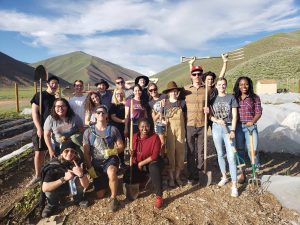
The Hope Garden in Hailey is aptly named. Adjacent to the Old Blaine County Courthouse in the middle of town, the lush garden is a place where anyone can find hope.
It grows in the sweet pea stocks and the ruffled carrot tops. It blossoms amongst the green beans and the eggplants. It’s fostered by the dirty fingers of everyone from little kids to retirees to hundreds of locals and visitors alike who tend to the veggies at The Hope Garden and the Bloom Community Farm in Quigley Canyon each week as volunteers.
The Hope Garden was founded by The Hunger Coalition (THC) in 2010 to help fulfill the nonprofit’s mission to build community through food. The success of the 10,000-square-foot garden—coupled with the results of the Community Food Assessment (CFA) done in 2015—inspired the creation of the larger, roughly two-acre Bloom Community Farm in 2016.
The CFA shared that food costs in Blaine County are some of the highest in the nation, which helps explain why it’s so easy for locals to become food insecure or to have difficulty affording healthy foods. The study also revealed that most folks don’t feel comfortable coming to a food bank, but they will work for their food. That’s one of the reasons why THC’s Volunteer for Veggies (V4V) program is so popular. For four days each week, the V4V program allows anyone to show up, help out and go home with locally grown, fresh and healthy food.
Thanks to the help of these volunteers, the gardens yield over 5,000 pounds of veggies annually, some of which goes to the volunteers and the rest to help THC feed our people.
It’s obvious to anyone who’s spent time at either spot that these places attract people with more than just free veggies or a chance to volunteer; they foster hope and help connect our community.
“It’s just impressive how they are just such fun places to be,” said Lynea Petty, food production manager for THC. “It’s fun to be at the garden, to chat and help out and see how food gets grown. Lots of people keep coming back for the low-pressure social structure as well. It’s a real community-building environment. It’s about more than just stigma-free food.”
More than 200 volunteers help grow over 40 different types of edible plants. The variety of vegetables is another reward for volunteers, who get to try things they may not regularly get, like Napa cabbage or beets. But no matter how tasty the produce is, THC’s garden and farm are doing more than just feeding bodies—they’re helping to feed hope, too.
“We believe everybody has the right to good food,” Lynea said, “so that’s what we’re working on.”
To find out more about the Volunteer for Veggies program, go to TheHungerCoalition.org, call (208) 788-0121 or come to The Chamber’s Business After Hours at the Bloom Community Farm next Thursday, July 25, from 5-7 p.m.
Mike McKenna is the executive director of The Chamber – Hailey & The Wood River Valley. He can be reached at Mike@ValleyChamber.org or by calling (208) 788-3484.


